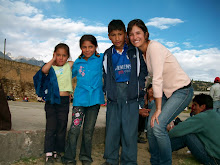 So as most of my readers know, I’m finishing up my third year in the Peace Corps serving as a Volunteer Leader and working in Huaraz, the capital city of Ancash, Peru. I’ve focused my time working with 50 teenaged youth on sexual health promotion and teen-pregnancy, STI and HIV prevention through the support of a small PEPFAR grant. Although one year is not much time in the educational spectrum, the lessons learned were enlightening for them and for me.
So as most of my readers know, I’m finishing up my third year in the Peace Corps serving as a Volunteer Leader and working in Huaraz, the capital city of Ancash, Peru. I’ve focused my time working with 50 teenaged youth on sexual health promotion and teen-pregnancy, STI and HIV prevention through the support of a small PEPFAR grant. Although one year is not much time in the educational spectrum, the lessons learned were enlightening for them and for me.Ancash is located in the Andes Mountains of Peru, and the primary language in the rural towns outside the capital city of Huaraz is Quechua. The people are descendants of the Incas and retain more cultural influence from their ancestors than of the Spanish, who conquered Peru in the 1500s. The Incan roots in the Ancashinos are evident in the language, the farming and agricultural techniques, the spiritualism, and the health practices. Let's focus on the latter. I have learned of myriad health myths - ancient beliefs - and I have had the opportunity to dispel some of them during my classes. Here are a few gems:
• If a woman stands in the rays of a rainbow, she'll become pregnant.
• Eating Peruvian lemon on your period will stop your cycle and endanger your reproductive system.
• Women on their period cannot bathe or engage in physical exercise; these activities could be harmful to her health.
• Men have more sex drive than women.
• Men with larger penises are more sexually powerful than men with smaller penises.
What I’ve realized working in Peru is that so much of sexual education in a developing country is related to addressing gender inequality. “Machismo,” the belief of masculine superiority that systematically and culturally marginalizes women, is an ingrained social issue in Ancash. On their final exams, my students generally scored high, and through conversations, I know that they’ve learned many truths about sexual health. So if I’ve played a tiny part in the grand scheme of gender inequality by dispelling myths and empowering my female students, I’d say that’s a success.


